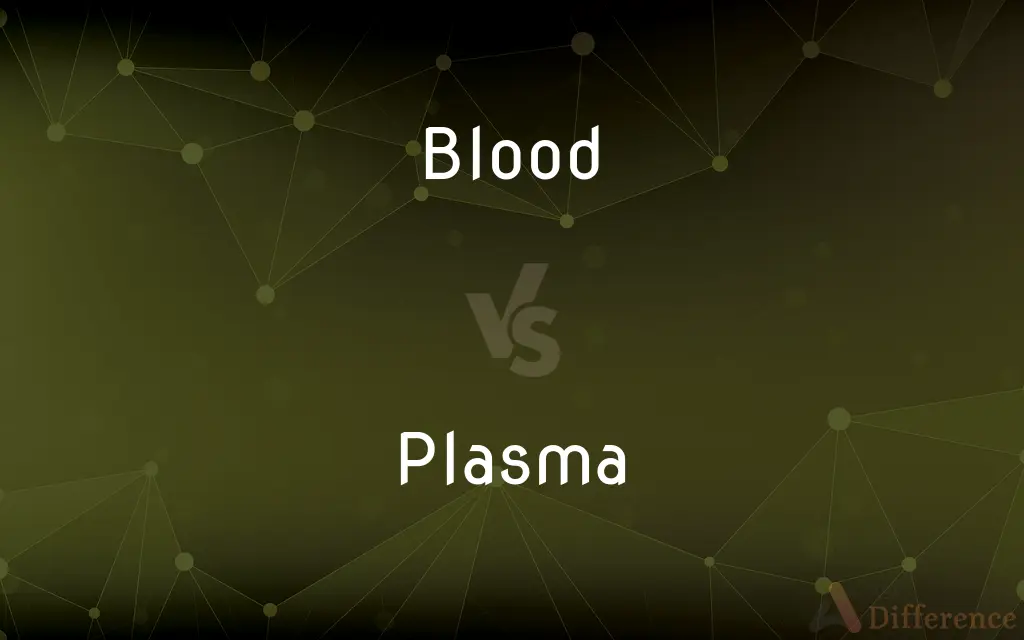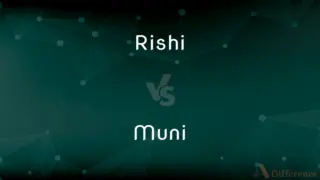Blood vs. Plasma — What's the Difference?
By Tayyaba Rehman — Updated on October 30, 2023
Blood is the body's primary fluid for transport, while plasma is its liquid component without cells.

Difference Between Blood and Plasma
Table of Contents
ADVERTISEMENT
Key Differences
Blood is a complex, circulating fluid in the body that performs vital functions, such as transporting oxygen and nutrients to cells and removing waste products. It is composed of various cellular components, including red blood cells, white blood cells, and platelets, all suspended in plasma. Blood plays a crucial role in immunity, coagulation, and regulation of body temperature.
Plasma, on the other hand, is the straw-colored liquid portion of blood that remains after red blood cells, white blood cells, platelets, and other cellular components have been removed. It constitutes about 55% of total blood volume and is primarily composed of water, electrolytes, nutrients, waste products, and plasma proteins. Plasma serves as a medium for the cells, facilitating their movement and carrying essential substances.
While blood is recognized for its red color, due to the presence of red blood cells, plasma is a clear, slightly yellowish fluid. Blood's main functions are transport, protection, and regulation, whereas plasma functions as a carrier for blood cells and a vehicle for carrying hormones, proteins, and nutrients throughout the body.
The difference between the two is not just in composition but also in function. Blood, as a whole, is responsible for systemic delivery and is the basis for various medical diagnostics and treatments. Plasma, while a part of blood, is significant for its role in maintaining blood pressure, volume, and pH balance. It is also used therapeutically in treatments like plasma exchange.
Blood cannot exist without plasma, as it is the medium in which cells are suspended. Plasma, while it can be separated from blood, does not contain the cellular components that define blood. It is often donated separately to help patients with clotting disorders or immune deficiencies, showcasing its distinct therapeutic properties.
ADVERTISEMENT
Comparison Chart
Definition
Fluid carrying cells and nutrients
Liquid part of blood without cells
Composition
Cells + Plasma
90-92% water + proteins, salts, lipids
Color
Red due to hemoglobin
Straw-colored
Functions
Transport, protection, regulation
Carrier for cells, proteins, nutrients
Clinical Use
Transfusions, tests
Therapy for clotting, immune disorders
Compare with Definitions
Blood
Blood carries oxygen to tissues.
Blood rushed to her face, blushing.
Plasma
Plasma is the liquid part of blood.
Plasma donations are crucial for patients with coagulation issues.
Blood
Blood contains genetic information.
Blood tests can reveal genetic disorders.
Plasma
Plasma contains clotting proteins.
Plasma proteins are vital for blood coagulation.
Blood
Blood is a body fluid in humans and other animals that delivers necessary substances such as nutrients and oxygen to the cells and transports metabolic waste products away from those same cells.In vertebrates, it is composed of blood cells suspended in blood plasma. Plasma, which constitutes 55% of blood fluid, is mostly water (92% by volume), and contains proteins, glucose, mineral ions, hormones, carbon dioxide (plasma being the main medium for excretory product transportation), and blood cells themselves.
Plasma
Plasma transports nutrients in blood.
The plasma was separated from the blood for further testing.
Blood
The fluid consisting of plasma, blood cells, and platelets that is circulated by the heart through the vertebrate vascular system, carrying oxygen and nutrients to and waste materials away from all body tissues.
Plasma
Plasma is used in therapies.
He received plasma therapy after the accident.
Blood
A similar fluid in animals other than vertebrates.
Plasma
The clear, yellowish fluid portion of blood, lymph, or intramuscular fluid in which cells are suspended. It differs from serum in that it contains fibrin and other soluble clotting elements.
Blood
The juice or sap of certain plants.
Plasma
Blood plasma, especially when sterilized and depleted of cells for transfusion.
Blood
A vital or animating force; lifeblood.
Plasma
Protoplasm or cytoplasm.
Blood
One of the four humors of ancient and medieval physiology, identified with the blood found in blood vessels, and thought to cause cheerfulness.
Plasma
The fluid portion of milk from which the curd has been separated by coagulation; whey.
Blood
Bloodshed; murder.
Plasma
(Physics) An electrically neutral, highly ionized phase of matter composed of ions, electrons, and neutral particles. It is distinct from solids, liquids, and gases.
Blood
Temperament or disposition
A person of hot blood and fiery temper.
Plasma
Of or relating to a flat-panel display used in televisions, made up of an array of tiny cells each containing a gaseous mixture of xenon and neon that is changed into a plasma state to illuminate a phosphor coating on the inside of the cell.
Blood
Descent from a common ancestor; parental lineage.
Plasma
(physics) A state of matter consisting of partially ionized gas and electrons.
Blood
Family relationship; kinship.
Plasma
(hematology) A clear component of blood or lymph containing fibrin.
Blood
Descent from noble or royal lineage
A princess of the blood.
Plasma
(hematology) Blood plasma, free of suspended cells, used in transfusions.
Blood
Recorded descent from purebred stock.
Plasma
(mineralogy) A variety of green quartz, used in ancient times for making engraved ornaments.
Blood
National or racial ancestry.
Plasma
A mixture of starch and glycerin, used as a substitute for ointments.
Blood
A dandy.
Plasma
A visual effect in which cycles of changing colours are warped in various ways to give the illusion of liquid organic movement.
Blood
A member of a tribe of the Blackfoot confederacy inhabiting southern Alberta.
Plasma
A variety of quartz, of a color between grass green and leek green, which is found associated with common chalcedony. It was much esteemed by the ancients for making engraved ornaments.
Blood
To give (a hunting dog) its first taste of blood.
Plasma
The viscous material of an animal or vegetable cell, out of which the various tissues are formed by a process of differentiation; protoplasm.
Blood
To subject (troops) to experience under fire
"The measure of an army is not known until it has been blooded" (Tom Clancy).
Plasma
Unorganized material; elementary matter.
Blood
To initiate by subjecting to an unpleasant or difficult experience.
Plasma
A mixture of starch and glycerin, used as a substitute for ointments.
Blood
A vital liquid flowing in the bodies of many types of animals that usually conveys nutrients and oxygen. In vertebrates, it is colored red by hemoglobin, is conveyed by arteries and veins, is pumped by the heart and is usually generated in bone marrow.
The cultists gathered around a chalice of blood.
Plasma
Same as blood plasma.
Blood
A family relationship due to birth, such as that between siblings; contrasted with relationships due to marriage or adoption (see blood relative, blood relation, by blood).
Plasma
A state of matter in which charged particles such as electrons and atomi nuclei have sufficiently high energy to move freely, rather than be bound in atoms as in ordinary matter; it has some of the properties of a gas, but is a conductor of electricity.
Blood
(historical) One of the four humours in the human body.
Plasma
Colorless watery fluid of blood and lymph containing no cells and in which erythrocytes and leukocytes and platelets are suspended
Blood
A blood test or blood sample.
Plasma
A green slightly translucent variety of chalcedony used as a gemstone
Blood
The sap or juice which flows in or from plants.
Plasma
(physical chemistry) a fourth state of matter distinct from solid or liquid or gas and present in stars and fusion reactors; a gas becomes a plasma when it is heated until the atoms lose all their electrons, leaving a highly electrified collection of nuclei and free electrons;
Particles in space exist in the form of a plasma
Blood
(poetic) The juice of anything, especially if red.
Plasma
Plasma maintains blood volume.
Plasma expanders are administered to maintain blood pressure.
Blood
Temper of mind; disposition; mood
Blood
(obsolete) A lively, showy man; a rake; a dandy.
Blood
A blood horse, one of good pedigree.
Blood
(figurative) Bloodshed.
They came looking for blood.
Blood
Alternative case form of Blood.
Blood
A friend or acquaintance, especially one who is black and male.
Blood
(transitive) To cause something to be covered with blood; to bloody.
Blood
To let blood (from); to bleed.
Blood
(transitive) To initiate into warfare or a blood sport, traditionally by smearing with the blood of the first kill witnessed.
Blood
The fluid which circulates in the principal vascular system of animals, carrying nourishment to all parts of the body, and bringing away waste products to be excreted. See under Arterial.
Blood
Relationship by descent from a common ancestor; consanguinity; kinship.
To share the blood of Saxon royalty.
A friend of our own blood.
Blood
Descent; lineage; especially, honorable birth; the highest royal lineage.
Give us a prince of blood, a son of Priam.
I am a gentleman of blood and breeding.
Blood
Descent from parents of recognized breed; excellence or purity of breed.
Blood
The fleshy nature of man.
Nor gives it satisfaction to our blood.
Blood
The shedding of blood; the taking of life, murder; manslaughter; destruction.
So wills the fierce, avenging sprite,Till blood for blood atones.
Blood
A bloodthirsty or murderous disposition.
He was a thing of blood, whose every motionWas timed with dying cries.
Blood
Temper of mind; disposition; state of the passions; - as if the blood were the seat of emotions.
When you perceive his blood inclined to mirth.
Blood
A man of fire or spirit; a fiery spark; a gay, showy man; a rake.
Seest thou not . . . how giddily 'a turns about all the hot bloods between fourteen and five and thirty?
It was the morning costume of a dandy or blood.
Blood
The juice of anything, especially if red.
He washed . . . his clothes in the blood of grapes.
Blood
To bleed.
Blood
To stain, smear or wet, with blood.
Reach out their spears afar,And blood their points.
Blood
To give (hounds or soldiers) a first taste or sight of blood, as in hunting or war.
It was most important too that his troops should be blooded.
Blood
To heat the blood of; to exasperate.
The auxiliary forces of the French and English were much blooded one against another.
Blood
The fluid (red in vertebrates) that is pumped by the heart;
Blood carries oxygen and nutrients to the tissues and carries waste products away
The ancients believed that blood was the seat of the emotions
Blood
The descendants of one individual;
His entire lineage has been warriors
Blood
The shedding of blood resulting in murder;
He avenged the blood of his kinsmen
Blood
Temperament or disposition;
A person of hot blood
Blood
A dissolute man in fashionable society
Blood
People viewed as members of a group;
We need more young blood in this organization
Blood
Smear with blood, as in a hunting initiation rite, where the face of a person is smeared with the blood of the kill
Blood
Blood is essential for life.
Doctors checked his blood for signs of the disease.
Blood
Blood is a circulatory body fluid.
The lab analyzed the blood sample for abnormalities.
Blood
Blood often symbolizes kinship.
They were bonded by blood as much as by friendship.
Common Curiosities
Can plasma exist without blood?
Plasma is a part of blood and cannot exist without it, though it can be separated for medical use.
How much of blood is plasma?
About 55% of blood's volume is plasma.
What is blood?
Blood is the body's fluid that circulates through the vessels, delivering essential substances and removing waste.
What is the primary function of blood?
Blood's primary function is to transport oxygen, nutrients, and waste products throughout the body.
What does plasma contain?
Plasma contains water, electrolytes, proteins, nutrients, and waste products.
Are blood and plasma the same color?
No, blood is red, while plasma is a clear, yellowish fluid.
What is plasma?
Plasma is the clear, straw-colored liquid component of blood that remains after blood cells are removed.
What is the significance of plasma in medicine?
Plasma is used in medical treatments, such as for clotting disorders or immune system deficiencies.
Do blood transfusions always include plasma?
Whole blood transfusions include plasma, but red blood cell concentrates may not.
How are blood and plasma donated?
Blood is donated via venipuncture; plasma may be donated through a process called plasmapheresis.
Why is blood red?
Blood is red because of the hemoglobin in red blood cells.
How are blood and plasma used in emergencies?
Blood is used in transfusions to replace lost volume; plasma is used to treat clotting disorders.
Can blood and plasma be stored?
Yes, both can be stored under specific conditions; blood has a shelf life of about 42 days, while plasma can be frozen and stored for up to a year.
Can someone with a blood disorder donate plasma?
It depends on the disorder; medical screening is required to determine eligibility.
What are blood types?
Blood types are classifications based on the presence or absence of certain antigens in the blood.
Share Your Discovery

Previous Comparison
Rishi vs. Muni
Next Comparison
Slitherer vs. SlitherAuthor Spotlight
Written by
Tayyaba RehmanTayyaba Rehman is a distinguished writer, currently serving as a primary contributor to askdifference.com. As a researcher in semantics and etymology, Tayyaba's passion for the complexity of languages and their distinctions has found a perfect home on the platform. Tayyaba delves into the intricacies of language, distinguishing between commonly confused words and phrases, thereby providing clarity for readers worldwide.















































